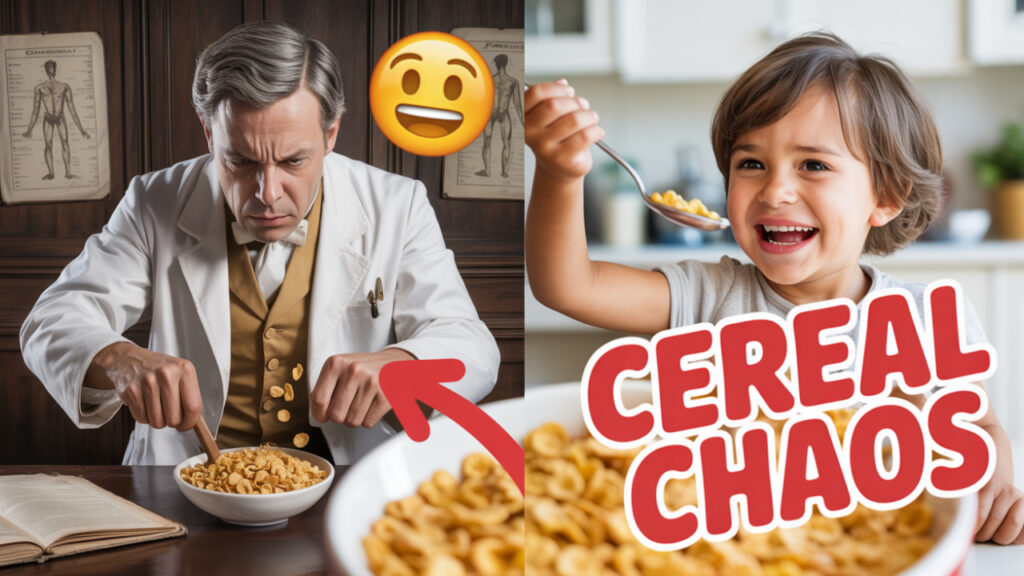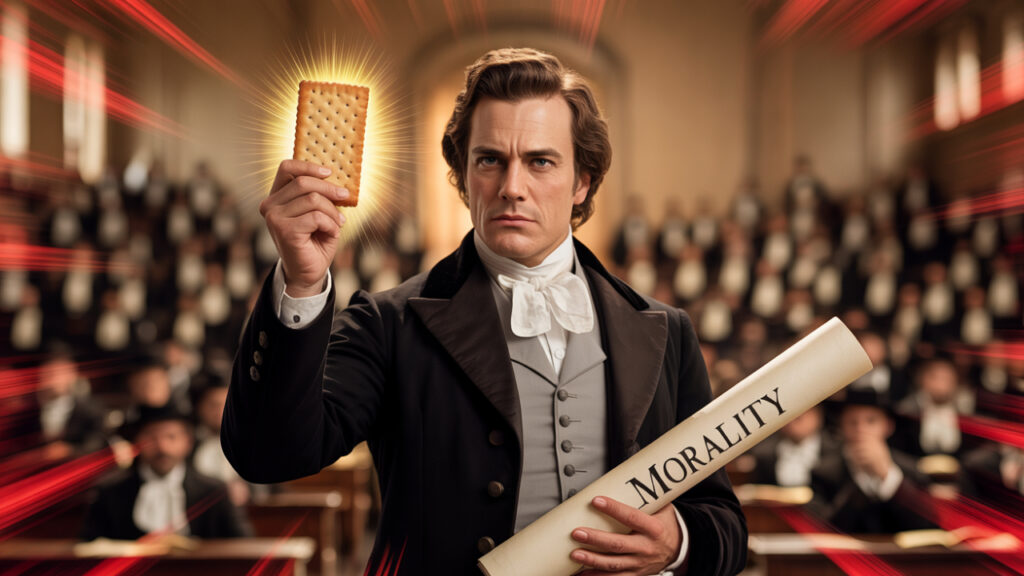Published on May 17, 2025 • Last Updated on May 17, 2025
⚡ TL;DR
- Corn flakes weren’t invented to taste good — they were created to curb sexual urges, especially among young men.
- The inventor, Dr. John Harvey Kellogg, was a doctor and devout Seventh-day Adventist who believed bland food could help people control their passions.
- His cereal empire was built on an anti-masturbation crusade — and that’s not even the strangest part.
➡️ Coming up: The feud between Kellogg and his brother over sugar, sex, and cereal profits.
🥄 The Cereal You Know Was Never Meant for Breakfast
What if I told you one of the world’s most iconic breakfast foods wasn’t invented to satisfy hunger… but to suppress it? Specifically, a very particular kind of hunger.
Corn flakes — those crispy golden flakes swimming in milk every morning — were born from a bizarre mix of religion, science, and a war on human desire. And no, this isn’t just a quirky footnote in food history…
It’s a window into a crusade against pleasure itself.
Ready to find out why your cereal might have started as an anti-sex invention?
It gets weird — fast.
⏳ The Strange Birth of Corn Flakes 🥣
It all started in a sanitarium.
In the late 1800s, a strict doctor named John Harvey Kellogg ran the Battle Creek Sanitarium in Michigan — part hospital, part wellness retreat. But this wasn’t a place for luxury spa treatments. It was a temple of control.
Kellogg believed that sexual urges were dangerous — especially masturbation, which he blamed for everything from acne to epilepsy. He thought it could literally ruin your soul.
So what was his prescription?
Cold showers, celibacy… and cereal.
Specifically, bland, tasteless food that wouldn’t excite the body or the mind. He believed spicy, rich, or flavorful meals stirred passions. And that’s where corn flakes came in.
But here’s the twist: Corn flakes weren’t an instant invention — they were an accident.
The Accident That Changed Breakfast Forever
In 1894, Kellogg and his brother, Will Keith Kellogg, were working on a bland vegetarian diet for the sanitarium’s patients. One day, they accidentally left boiled wheat out too long. It got stale. Rather than toss it, they tried rolling it out — and it flaked.
They baked the flakes, served them up… and patients actually liked them.
Soon, they switched from wheat to corn for a lighter flake. And just like that, corn flakes were born.
But this accidental discovery would lead to a multi-million-dollar industry — and a bitter feud.
🎥 Watch this unravel…
Ever wondered how a food meant to stop self-pleasure became a global breakfast icon? This documentary dives deep into the twisted origin of your cereal box.
👉
Now here’s what really happened next…
🔥 The Crusade Against Pleasure
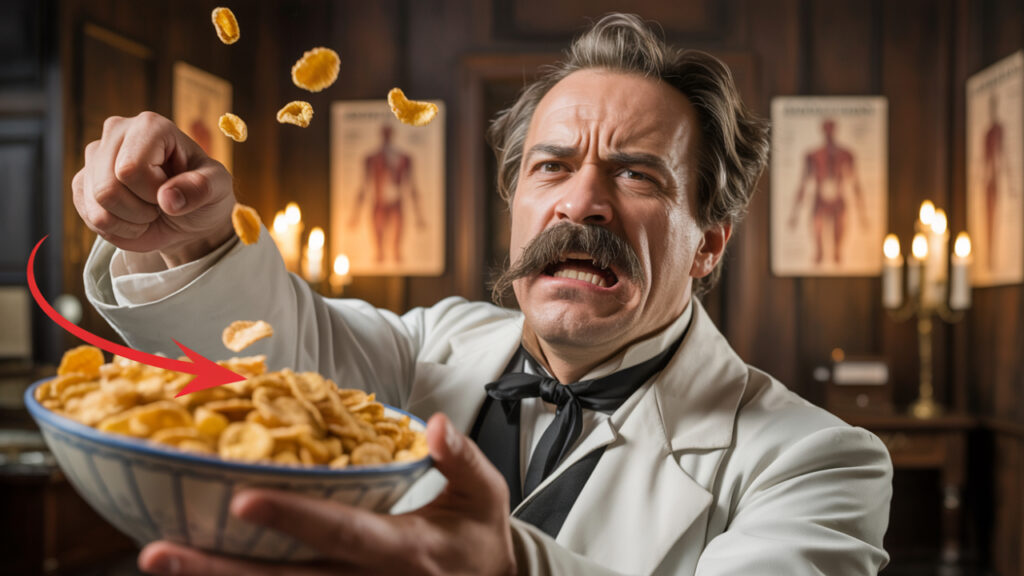
John Harvey Kellogg wasn’t just making cereal. He was fighting a war.
Not against hunger. Not even against illness.
But against sexual desire itself — especially masturbation, which he believed was humanity’s silent destroyer.
Inside Kellogg’s Mind: Masturbation = Death?
To Kellogg, sex was for procreation — not pleasure.
He never consummated his own marriage, sleeping in a separate room from his wife for over 40 years. They adopted all their children.
But it gets darker.
He believed masturbation caused tuberculosis, epilepsy, poor posture, bad eyesight, and even mental breakdowns.
His 1887 book Plain Facts for Old and Young outlines gruesome “solutions”:
- Carbolic acid on girls’ clitorises to prevent stimulation
- Circumcision without anesthesia for boys — to inflict pain and discourage future attempts
- Mechanical restraints worn at night
Yes — this was real medical advice. And corn flakes? Just another tool in the arsenal.
Food as a Weapon
Kellogg believed spicy, flavorful food inflamed the senses.
So, to stop “self-abuse,” people needed bland diets. Enter:
- Corn flakes
- Graham crackers
- Plain toast
All part of a moral eating plan designed to “cool the body and calm the mind.”
The logic? If your breakfast was boring enough, your urges would be too.
And for a while, people actually bought into this.
💔 Brother vs. Brother: The Cereal War No One Talks About
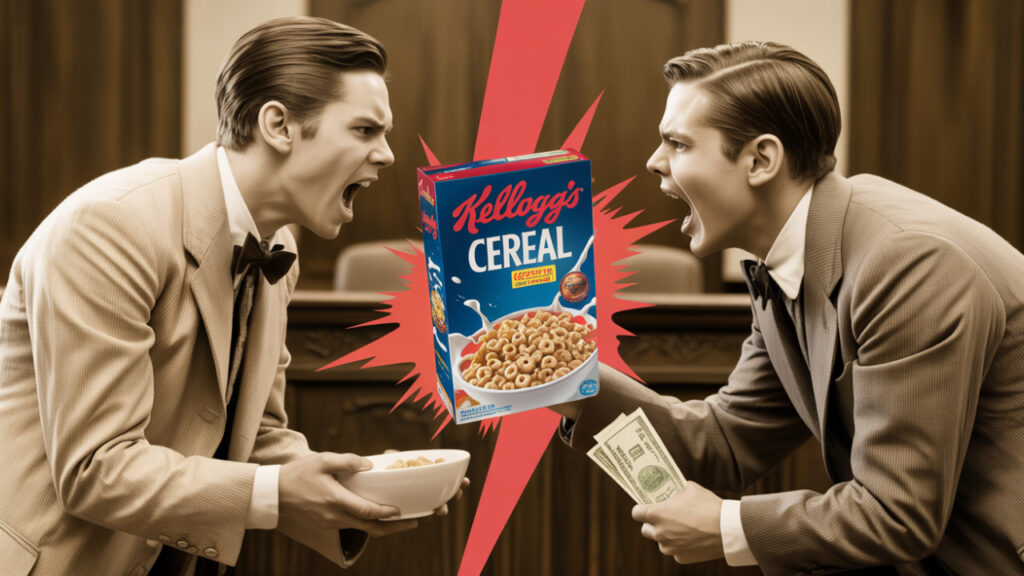
One wanted to fight sin. The other wanted to sell cereal.
Dr. John Harvey Kellogg may have invented corn flakes, but it was his younger brother, Will Keith Kellogg, who saw their true potential — not as moral medicine, but as a mass-market product. You can read details about the brother’s feud here.
And that’s where everything fell apart.
The Great Kellogg Split
While John was busy running the sanitarium and promoting strict, sugarless diets, Will was thinking business.
He wanted to add sugar to the flakes, make them tastier, and sell them to the general public — not just health freaks in Michigan.
John was horrified. To him, adding sugar was corrupting the purpose of corn flakes.
He believed sweetened cereal would excite the senses, the exact opposite of what he intended.
The brothers clashed — not just over cereal, but ideology, money, and morals.
The Lawsuit That Changed Breakfast Forever
In 1906, Will went behind his brother’s back and started the Battle Creek Toasted Corn Flake Company.
He trademarked the family name — Kellogg — and began mass-producing sweetened corn flakes, marketing them to kids, families, and hungry workers across the country.
John, furious, sued him. The case dragged on for years.
In 1920, the courts ruled in favor of Will.
He won the rights to the name. The brand. The fortune.
And John? He faded into the background, watching his “anti-sex cereal” become a sugary global phenomenon.
The war was over. Sugar won.
🧠 The Misunderstood Legacy of Corn Flakes

Most people think corn flakes were just a healthy breakfast option.
But their true origin story is tangled in moral panic, medical myths, and corporate betrayal — and very few know the full truth.
So how did we get from anti-masturbation medicine… to a global breakfast brand?
Let’s break it down.
From Sanitarium to Supermarket
By the 1920s, Will Kellogg had built an empire. His version of corn flakes — with sugar, advertising, and fun cartoon mascots — swept the globe.
John’s original intent was buried under a mountain of marketing.
Today, Kellogg’s is one of the largest food companies in the world, selling cereals in over 180 countries.
Yet almost no one realizes that the first flake was meant to quell desire, not hunger.
What We Still Get Wrong
Even now, health influencers and wellness sites call corn flakes a “clean” or “wholesome” option.
But let’s be real:
- They’re mostly processed corn, stripped of fiber
- Often loaded with sugar, additives, and artificial vitamins
- And they lack the original moral purpose (thankfully)
Modern corn flakes are about taste, convenience, and brand loyalty — not purity, celibacy, or psychological restraint.
But every time you pour a bowl…
you’re eating a relic of one man’s war on pleasure.
🚀 What’s Next for Corn Flakes and Their Controversial Legacy?

You might think this is just a weird story from history… but it’s not over.
Corn flakes are still on millions of tables every morning. But now, we live in a world that’s obsessed with wellness, clean eating, and rediscovering food origins.
And suddenly — people are asking:
Wait… why were corn flakes invented again?
The Ironic Revival
Ironically, some modern health trends are circling right back to Kellogg’s original ideas:
- Plant-based diets
- Minimalist meals
- Gut health and probiotics
Dr. Kellogg would’ve loved that part — minus the sugar and cartoon tigers.
But today’s consumers aren’t trying to suppress desire. They’re chasing energy, clarity, longevity.
We’ve flipped the script.
From purity to performance. From fear to function.
Corn Flakes in Pop Culture & Memes
TikTok, Reddit, and YouTube have revived the myth in a totally different way — turning the origin story into viral jokes, ironic memes, and reaction videos.
“Wait… corn flakes were invented to stop WHAT? 😳”
That sense of shock? It’s fueling a new wave of curiosity — and maybe even a rebranding moment for Kellogg’s if they dare lean in.
🧠 So… Were Corn Flakes Really Invented to Stop Masturbation?
Yes.
That’s the wild truth.
What began as a bland breakfast idea inside a Victorian sanitarium morphed into a billion-dollar empire — but its roots are tangled in fear, purity, and one man’s obsession with controlling desire.
And now, every box of cereal on the shelf carries a legacy its creator would probably hate.
So the next time you pour a bowl of corn flakes…
ask yourself: Is this breakfast? Or is this history?
Or better yet:
Would you still eat it if the original purpose wasn’t flavor — but shame?
📥 Want to go deeper? Download the free printable cheat sheet: “5 Foods With Secretly Disturbing Origins“
→ Use it for dinner party trivia, TikTok videos, or just to never look at your pantry the same way again.
🙋♂️ Frequently Asked Questions
Were corn flakes actually invented to stop people from masturbating?
Yes — the original purpose behind corn flakes, according to inventor Dr. John Harvey Kellogg, was to reduce sexual desire, particularly masturbation. He believed bland food would suppress “impure thoughts,” and corn flakes were part of his anti-pleasure diet.
Did Kellogg really believe masturbation caused diseases?
Shockingly, yes. Kellogg blamed masturbation for a laundry list of ailments including epilepsy, bad posture, acne, and even insanity. In his writings, he promoted extreme “cures” like circumcision without anesthesia and chemical treatments — ideas that today are considered pseudoscientific and harmful.
Did both Kellogg brothers agree on how to make corn flakes?
Not at all. John Kellogg wanted corn flakes to remain plain and moral. Will Kellogg, his brother, saw their potential as a commercial food product and added sugar — sparking a feud that ended in a major lawsuit. Will won, and Kellogg’s became a global cereal empire.
Is there still sugar in modern corn flakes?
Yes. While corn flakes were originally meant to be bland and unsweetened, modern versions often contain added sugar and are marketed as tasty, convenient breakfast options — the opposite of what John Kellogg intended.
Do other breakfast foods have weird origins too?
Definitely. Graham crackers were invented for similar reasons — to promote spiritual purity and reduce “lustful cravings.” Many common foods have bizarre or dark origin stories once you dig deep enough. (We’ve got a whole article coming on that…)
Did Dr. Kellogg ever regret inventing corn flakes?
While there’s no clear record of him expressing regret, it’s likely he was disappointed by how corn flakes evolved. He lost the legal rights to the brand and watched his invention become a sugary, kid-friendly food — exactly the kind of product he despised.
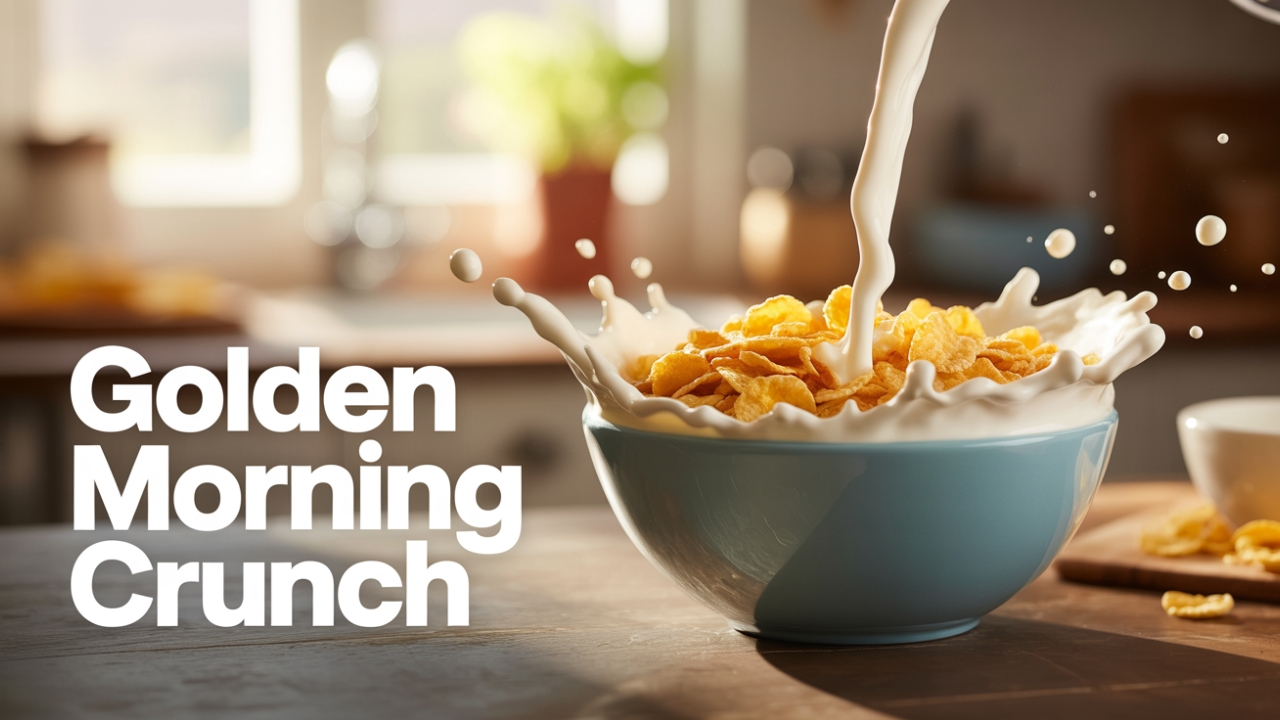
Kellogg’s Corn Flakes (6 Boxes)
Crispy, classic, and surprisingly controversial. The cereal that sparked a moral war now delivers a crunchy morning delight.
⭐️⭐️⭐️⭐️⭐️ 4.8/5 rating from 2,700+ buyers
💼 Tools You’ll Actually Use
These are trusted platforms we personally use and recommend. They can help you level up your listening, freelancing, or online privacy.
🔒 This post contains affiliate links. If you click and buy, we may earn a small commission — at no extra cost to you. Thanks for supporting the site!

John Green is the founder of OwlRatings.com, where he reviews and ranks the best products to help smart shoppers make informed decisions. With years of experience in content strategy, consumer research, and SEO, John specializes in turning complex comparisons into clear, trustworthy guides. When he’s not analyzing gear, you’ll find him deep in a rabbit hole of emerging tech or brewing a perfect cup of coffee.

